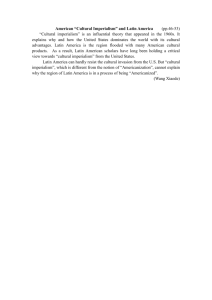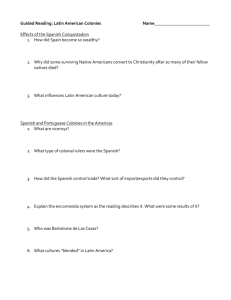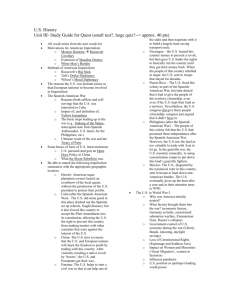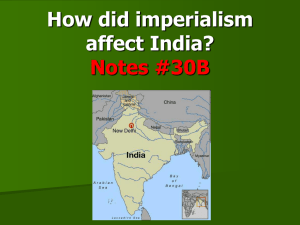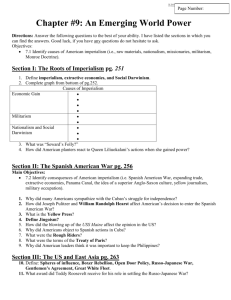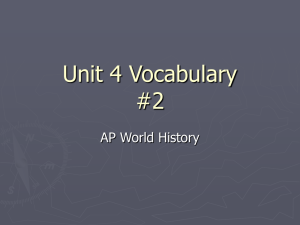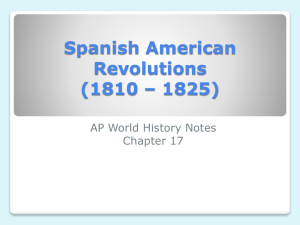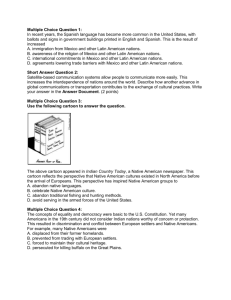Empire Building in Africa and Asia
advertisement
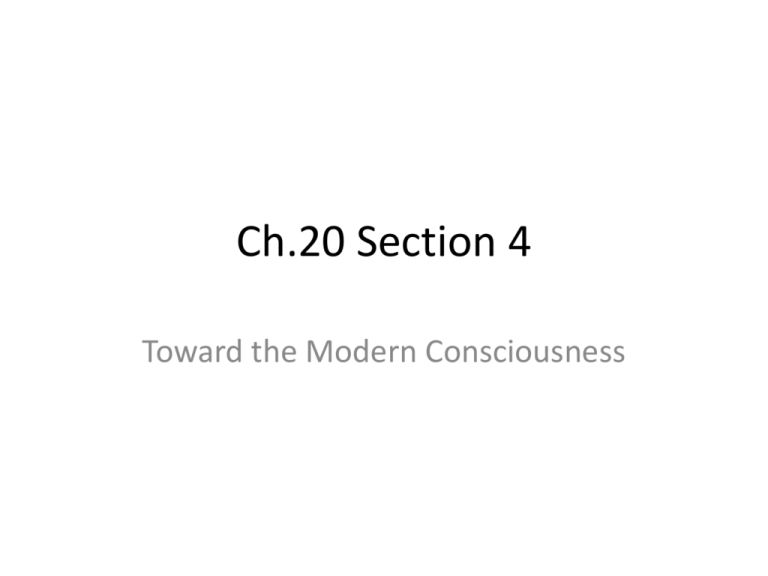
Ch.20 Section 4 Toward the Modern Consciousness Albert Einstein Albert Einstein German-born scientist working in Switzerland and eventually the United States. 1905 published the theory of relativity, which stated that space and time are not absolute but are relative to the observer. http://www.youtube.com/watch?v=ev9zrt__lec • "Anyone who has never made a mistake has never tried anything new." • "Two things are infinite: the universe and human stupidity; and I'm not sure about the the universe." • "I know not with what weapons World War III will be fought, but World War IV will be fought with sticks and stones." • When you are courting a nice girl an hour seems like a second. When you sit on a redhot cinder a second seems like an hour. That's relativity. Marie Curie French scientist who discovered that an element called radium gave off energy, or radiation that apparently came from within the atom itself. Atoms were not simply hard material bodies, but small active worlds. -Only woman to win the Nobel Prize in two fields and the only person to win in multiple sciences (Physics and Chemistry). Sigmund Freud Doctor from Vienna, proposed a series of theories that raised questions about the nature of the human mind. His major theories were published in the Interpretation of Dreams (1900) According to Freud, human behavior was strongly determined by past experiences and internal forces which people were largely unaware. Pyschoanalysis, where a therapist and patient could probe deeply into the patients memory. Freudian Slip A Freudian slip is a verbal or memory mistake that is believed to be linked to the unconscious mind. Pyschosexual Development According to Freud, most of an individuals personality is developed based upon their experience up to age 5. Social Darwinism and Racism Social Darwinism, Charles Darwins theories were applied to human society in a radical way by nationalists! (Example: German nationalism in WWII) Ethnicity: http://www.pbs.org/race/002_SortingPeople/002 _00-home.htm http://www.youtube.com/watch?v=jwpO-nnFY9g Anti-Semitism / Zionism Anti-Semitism Hostility toward and discrimination against Jews. It has existed from the Middle Ages, since the Jews were portrayed as the murders of Christ. Zionism From the 19th century as the Jewish community became part of the main stream society an idea began to emigrate to Palestine . Settlement in Palestine was difficult, because itw as then part of the Ottoman Empire which opposed to Jewish immigration. Ch.21 The Height of Imperialism New Imperialism In the nineteenth century, a new phase of Western expansion into Asia and Africa began. European nations began to view Asian and African societies as a source of industrial raw materials. Imperialism, the extension of a nations power over other lands, was not new, however this new type of imperialism was different in the sense that the conquests were strongly motivated based upon gaining advantages over other European rivals and gaining national prestige. New Imperialism • In addition imperialism was tied to Social Darwinism and Racism. • At the same time, there were people who viewed Europeans entering Africa/Asia as a humanitarian purpose to spread Christianity and moral responsibility called the White mans burden. White Mans Burden Take up the White Man's burden-Send forth the best ye breed-Go, bind your sons to exile To serve your captives' need; To wait, in heavy harness, On fluttered folk and wild-Your new-caught sullen peoples, Half devil and half child. Take up the White Man's burden-The savage wars of peace-Fill full the mouth of Famine, And bid the sickness cease; And when your goal is nearest (The end for others sought) Watch sloth and heathen folly Bring all your hope to nought. South East Asia Great Britain Britain founded a new colony in 1819 at the tip of the Malay Peninsula called Singapore. Following Singapore Britain would extend to the Kingdom of Burma. France The French were in Vietnam and forced the Vietnamese to accept French protection when the British neared Vietnamese territory. The French eventually took over Hanoi in 1884 and created a French protectorate, a political unit that depends on another government for its protection. Thailand The Exception After French conquest of Indochina, Thailand (Formerly known as Siam) was the only remaining free state in Southeast Asia. The main reason the Thai were able to stay independent were their Western Friendly Policies implemented by their leaders King Mongkut and King Chulaongkorn. The United States In 1898 Commodore George Dewey helped the US defeat the Spanish fleet in Manila Bay. In order to “Civilize” the Philippines, President William McKinley decided to turn the Philippines into an American colony. -The Philippines was strategically in a great position for the United States, due to its close distance to China. -Led by Emilio Aguinaldo, their was a resistance for Pilipino independence, however this was shut down by the US military. Direct and Indirect Rule Direct Rule When local rulers were removed and the colonizers directly took over. -Example, Burma Indirect Rule When local rulers were allowed to maintain their positions of authority and status. -Cost effective and convenient -Example, Dutch East Indies Economies Agricultural/Raw Materials: Often the colonies were used purely for extraction of various raw materials such as rubber, tin, spices, coffee, wood, gold, sugar. The colonial rules did bring some benefits. It led towards a modern economic system and also helped create railroads, highways and other infrastructure for the local economies. Resistance Resistance took various forms. In Burma the monarchy directly revolted where as in Vietnam the emperor agreed to French control, but the people resisted. Many of the resistance movements were led by a new class, the new middle class which has been educated Western-style. Ch.21 Section 2 Empire Building in Africa West Africa West Africa was affected greatly by the slave trade. However, by the late 1800s most countries had banned slavery, and Europe's interest in Africa had shifted from slavery towards the various natural resources in the area such as peanuts, timber, hides and pal oil. The British annexed the west coastal states and created the first British colony of Gold coast The French took over a large area of West Africa controlling most of the area. The Germans controlled Togo, Cameroon, German Southwest Africa and German East Africa North Africa Egypt: Muhammad Ali seized power in 1805 establishing an Egyptian state independent to the Ottoman Empire. In 1854 a French entrepreneur, Ferdinand de Lesseps signed a contract to begin building the Suez Canal. 1914 Egypt becomes part of the British protectorate. French: The French had colonies in Algeria where there were 150,000 French people. France imposed a protectorate on Tunisia and Morocco. Italy: Attempted to take over Ethiopia in 1896, however was defeated. Italy was now the only European state defeated by an African state. However, in 1911 the Italians were able to defeat Turkish Tripoli which it renamed Libya. Central Africa 1876 King Leopold of Belgium hires Henry Stanley to set up Belgian settlements in the Congo. Leopold occupied most of the territories around the Congo river, the French occupied the areas farther north. -The occupation of the Belgians in the Congo was incredibly violent. Belgians in the Congo http://www.youtube.com/watch?v=qx2Sj1fhSso (BBC 10minute Documentary) East Africa Britain and Germany were rivals in East Africa. Much of the territory in the Eastern part of Africa was decided through a conference held in Berlin in 1884 and 1885. No African delegates were present during this conference where the British, Germans and Portuguese decided how to divide up the territory of East Africa.. South Africa The Boers or Afrikaners were original Dutch settlers who had occupied Cape Town and surrounding areas. During the Napoleonic Wars, the British seized these lands from the Dutch. In the 1830’s, the Boers fled North. The Boers who believed that White superiority was ordained by God, put many of the indigenous peoples in areas on reservations. There, they battled the indigenous people, the Zulus. South Africa 2 The British eventually took over the territory and named it Rhodesia. The Boers resisted British rule in the area, which started the Boer War (1899-1902) The British were victorious and create dan independent Union of South Africa, which included the old Cape Colony and the Boer republics. In order to appease the Boers, the British passed a law that only Whites can vote. Colonial Rule in Africa By 1914, Great Britain, France, Germany, Belgium, Italy, Spain and Portugal had divided up Africa. Only Liberia, which had been created as a homeland for freed United States slaves and Ethiopia remained free. The British tended to use Indirect rule The French tended to use Direct rule African Nationalism Although the middle class Africans were not as negatively effected as the lower class, their was a glass ceiling. Africans could only attain a certain level in businesses and government and the higher level positions were saved for Europeans. Additionally, Europeans would express their superiority through segregated clubs, schools and churches. This stirred resentment towards Europeans by the educated Africans which would eventually lead towards political actions in the early 1900s. Ch.21 Section 3 British Rule in India The Sepoy Mutiny To rule India, the British East India Company had its own soldiers and forts. It also hired Indian soldiers known as sepoys, to protect the companies interests in the region. 1857, Indian distrust towards Britain led to a revolt, this was known as the Great Rebellion or the Sepoy Mutiny. In India it is recognized as the First War of Independence. The Rebellion was crushed by the British, however atrocities were committed on both sides. In 1876, the title of the Empress of India was bestowed on Queen Victoria, India was now officially a colonial subject under the crown. The British in Indian The British used direct rule using viceroy, who assisted the British civil service staff. Benefits: New School System: served only elites and served many children to serve in gov. and military. 90% remained illiterate. Railroads, telegraphs, postal services were introduced. Costs: Financial benefits were reaped by the British and the elite Indians. British industries destroyed local manufactures. In rural areas, zamindars (Local officials used to collect taxes) abused their powers and over taxed people. Farms were encouraged to grow cotton, not food. British ruling was degrading. They looked down upon Indian cultures and even the elites. An Indian Nationalist Movement Early Movements Were instigated by the upper class who were English educated and started up in urban areas such as Mumbai, Chennai, and Calcutta. Indian National Congress (INC) Formed in 1885 Religious differences created difficulties In 1915, when Mohandas Gandhi returned to India he helped the country move towards independence. Gandhi “Live as if you were to die tomorrow. Learn as if you were to live forever.” “You can chain me, you can torture me, you can even destroy this body, but you will never imprison my mind.” "Generations to come, it may well be, will scarce believe that such a man as this one ever in flesh and blood walked upon this Earth.” Einstein on Gandhi Colonial Indian Culture Indian novelists and poets wrote historical romances and epics, most wrote in Indian not feeling comfortable using colonial language (English). Rabindranath Tagore A social reformer, spiritual leader, educator, philosopher, singer, painter and international spokesperson help set up schools and promoted the idea of Indian nationalism and promoted human dignity. Ch.21 Section 4 Nation Building in Latin America Social Classes in the Americas Peninsulares: Held all important positions Creoles: Controlled land and business but were regarded as second-class citizens by Peninsulares. Mestizos: the largest group but worked as servents or laborers. Leading to a Revolution The Creoles deeply resented the peninsulares and found the ideas of equality and freedom of press and trade to be something attractive. The Portuguese and the Spanish dominated the Americas and benefited from most of the trades. Portuguese Spanish Weakness The two powers were significantly weakened when napoleon overthrew them in the early 1800s. Those in the Americas took advantage of this event and began to revolt against the Spanish and Portuguese. Saint Domingue / Haiti 100,00 slaves revolved and seized all of Hispaniola, a French colony. This area is known as Haiti today. Revolt in Mexico Miguel Hidalgo, studied the French Revolutions and roused the local Indians and mestizos to free themselves from the Spanish. His attacks against the Spanish failed, and he was sentenced to death. In fear that the masses would cooperate and overthrow the Peninsulares and Creoles, they selected a creole military leader Agustin de Iturbide. 1821, Mexico declared its independence from Spain. Revolts in South America Revolts in Argentina were led by Jose de San Martin, who attacked the Spanish in Chile in 1817. Revolts in Venezuela was led by Simon Bolivar who helped the Argentinians defeat the Spanish army at Aycucho on 1824. By the end of 1824, Peru, Uruguay, Paraguay, Colombia, Venezuela Argentina, Bolivia, and Chile had all become free from Spain. In 1838 the Central American states divided into 5 republics. Haiti Crash Course https://www.youtube.com/watch?v=ZBw35Ze 3bg8 The Monroe Doctrine The United States president in 1823 declared the Monroe Doctrine, he guaranteed the independence of the new Latin American nations and warned against any European intervention in the Americas. Difficulties of Nation Building The new nations faced serious problems between 1830 to 1870. The wars for independence had resulted in loss of people, property and livestock. The new nations not sure where borders were went to war with each other, poor roads and thick jungles made transportation poor and the Latin American nations found themselves relying on Europeans for their economy once again. Caudillos Caudillos ruled chiefly by military force and were usually supported by the landed elites. Many kept the new national states together. Caudillos and Mexico Example; Antonio Lopez de Santa Anna, for example, ruled Mexico from 1833 to 1855. He misused state funds, halted reforms, and created chaos. Eventually in 1835 American settlers in the Mexican state of Texas revolted against Santa Annas rule. War between the USA and Mexico soon followed (1846-1848), Mexico was defeated and lost almost one-half of its territory to the United States. Following Santa Anna, Benitto Juarez took control of Mexico and helped rebuild the nation, separating church and state, distributing land to the poor and creating a national education system. *Big problem with Caudillos system is that once they died they lost power and often civil wars erupted (Venezuela today?) New Imperialism (Latin America Version) In the era of New Imperialism, the Spanish and Portuguese were no longer the major presence in Latin America. Instead the British took over the region in order to take advantage of Latin Americas wheat, tobacco, wool, sugar, coffee and hides. The Elite Problem A consistent problem for all of Latin America was that the society was dominated by elites. Land remained the basis of wealth, social prestige and political power and had landowners making enormous profits creating only one type of crop for foreign export. The US in Latin America The US as a result of the Spanish-American War gained much territory in Mexico as well as gained Cuba as a protectorate and annexed Puerto Rico. The US helped Panama in a rebellion in 1903, in return the US received control of a strip of land 10 miles wide running from coast to coast in Panama, the US built the Panama Canal here in 1914. Revolutions in Mexico Porfirio Diaz, ruled Mexico between 1877 to 1911 created a conservative, centralized government with the support of the army, foreign capitalists and large land owners and the Catholic Church. When liberal land owner Francisco Madero took power in 1911, he opened way for a revolution. Emiliano Zapata helped arouse the masses of landless peasants to begin seize the estates of wealthy land holders. The revolution between 1910-1920 cost the Mexican economy greatly. Economic Change in Latin America Many nations began to focus on exporting one or two few basic items. For example, Argentinawheat and beef, Brazil-coffee and bananas, Central America-sugar and Peru-silver. The middle class began to expand and cities began to grow following the United States as a model for economic development.
